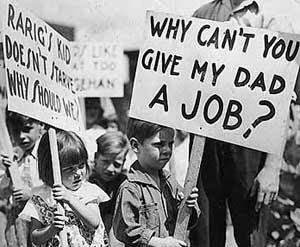
"Homeless and jobless men wait outside to get free dinner during the Great Depression"
Photo courtesy of: http://www.washingtontimes.com/news/2009/feb/08/how-to-cause-a-depression/
Poverty, starvation, shame, and a decreasing sense of worth could describe the condition of most American families during the Great Depression. If a family was fortunate enough to stay together during this difficult time, the roles in the family changed dramatically (All About History, 2002). For instance, the wife and children often had to work in order to survive (All About History, 2002). In an attempt to compensate for the lack of income, families would live with relatives or friends. In addition, it was common for a father to abandon his family because of the desolation and decreasing sense of worth he felt in not being able to provide for his family (Eyewitness to History, 2000). Moreover, in order to prudently deal with the impending doom of the economy, many couples delayed marriage, divorce, and having children (All About History, 2002). Often times, in an attempt to save their homes, some of the middle class families took on boarders and stretched their already tight budget to feed their new guests (All About History, 2002). However, due to the high unemployment rate, many houses, cars, and furniture were repossessed in order to cover the debt (Effects on America, n.d.). Many of these middle class families lost their homes and were forced to live on the streets.
The Great Depression did not thrust The United States into immediate poverty, but it did affect everyone in the country and especially the unemployed, poor white, and black populations. Disproportionate lending powered the financial systems during the 1920’s, then during the Great Depression it decreased loan availability. As one would have guessed, Americans who had credit during the 1920’s found they were unable to make the minimum monthly payments during the Depression. The few people who were fortunate enough to work during the Depression were uncertain of their future and many lost wages or hours. Consequently, the unemployment rate during the Depression hit an all time high of 25% in 1933. Unfortunately, for many Americans there was no government system set up to help the unemployed (Effects on America, n.d.). Not only were jobs rare but food became a scarcity during the Great Depression. According to a child survivor of this era, “Food and jobs were hard to get and many people stood in lines for government hand-outs. A lot of people lived on powdered milk, dried beans, and potatoes” (All About History, 2002). The lack of food and jobs during the Depression is dreadful to imagine and is often hard to describe, especially for those who were there to witness its abhorrent effects on the American people.
References
All about history: life during the great depression. (2002). Retrieved September 15, 2010, from http://www.thegreatdepression.co.uk/effects-on-america/
Eyewitness to history: America inthe great war. (2000). Retrieved September 15, 2010, from http://www.eyewitnesstohistory.com/snprelief1.htm
How to cause a Depression.(2010). The Washington Times. Retrieved on
September 19,2010, from http://www.washingtontimes.com/news/2009/feb/08/how-to- cause-a-depression/
The Great Depression: effects on America. (n.d.). Retreived September 15, 2010, from http://www.thegreatdepression.co.uk/effects-on-america/




